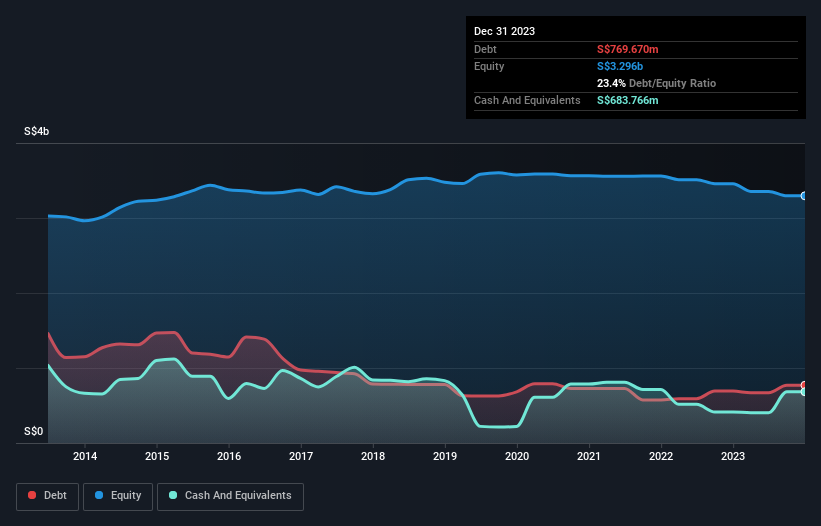Howard Marks put it nicely when he said that, rather than worrying about share price volatility, 'The possibility of permanent loss is the risk I worry about... and every practical investor I know worries about.' It's only natural to consider a company's balance sheet when you examine how risky it is, since debt is often involved when a business collapses. We note that Wing Tai Holdings Limited (SGX:W05) does have debt on its balance sheet. But is this debt a concern to shareholders?
Why Does Debt Bring Risk?
Generally speaking, debt only becomes a real problem when a company can't easily pay it off, either by raising capital or with its own cash flow. If things get really bad, the lenders can take control of the business. While that is not too common, we often do see indebted companies permanently diluting shareholders because lenders force them to raise capital at a distressed price. Of course, the upside of debt is that it often represents cheap capital, especially when it replaces dilution in a company with the ability to reinvest at high rates of return. The first thing to do when considering how much debt a business uses is to look at its cash and debt together.
Check out our latest analysis for Wing Tai Holdings
How Much Debt Does Wing Tai Holdings Carry?
The image below, which you can click on for greater detail, shows that at December 2023 Wing Tai Holdings had debt of S$769.7m, up from S$691.7m in one year. However, it does have S$683.8m in cash offsetting this, leading to net debt of about S$85.9m.

How Healthy Is Wing Tai Holdings' Balance Sheet?
According to the last reported balance sheet, Wing Tai Holdings had liabilities of S$248.0m due within 12 months, and liabilities of S$703.7m due beyond 12 months. Offsetting this, it had S$683.8m in cash and S$658.2m in receivables that were due within 12 months. So it actually has S$390.3m more liquid assets than total liabilities.
This luscious liquidity implies that Wing Tai Holdings' balance sheet is sturdy like a giant sequoia tree. With this in mind one could posit that its balance sheet means the company is able to handle some adversity.
We measure a company's debt load relative to its earnings power by looking at its net debt divided by its earnings before interest, tax, depreciation, and amortization (EBITDA) and by calculating how easily its earnings before interest and tax (EBIT) cover its interest expense (interest cover). Thus we consider debt relative to earnings both with and without depreciation and amortization expenses.
Weak interest cover of 0.28 times and a disturbingly high net debt to EBITDA ratio of 8.4 hit our confidence in Wing Tai Holdings like a one-two punch to the gut. This means we'd consider it to have a heavy debt load. Even worse, Wing Tai Holdings saw its EBIT tank 81% over the last 12 months. If earnings continue to follow that trajectory, paying off that debt load will be harder than convincing us to run a marathon in the rain. When analysing debt levels, the balance sheet is the obvious place to start. But it is Wing Tai Holdings's earnings that will influence how the balance sheet holds up in the future. So if you're keen to discover more about its earnings, it might be worth checking out this graph of its long term earnings trend.
Finally, while the tax-man may adore accounting profits, lenders only accept cold hard cash. So it's worth checking how much of that EBIT is backed by free cash flow. During the last three years, Wing Tai Holdings generated free cash flow amounting to a very robust 93% of its EBIT, more than we'd expect. That positions it well to pay down debt if desirable to do so.
Our View
Wing Tai Holdings's EBIT growth rate was a real negative on this analysis, as was its interest cover. But like a ballerina ending on a perfect pirouette, it has not trouble converting EBIT to free cash flow. Looking at all this data makes us feel a little cautious about Wing Tai Holdings's debt levels. While we appreciate debt can enhance returns on equity, we'd suggest that shareholders keep close watch on its debt levels, lest they increase. There's no doubt that we learn most about debt from the balance sheet. However, not all investment risk resides within the balance sheet - far from it. We've identified 2 warning signs with Wing Tai Holdings (at least 1 which doesn't sit too well with us) , and understanding them should be part of your investment process.
At the end of the day, it's often better to focus on companies that are free from net debt. You can access our special list of such companies (all with a track record of profit growth). It's free.
Valuation is complex, but we're here to simplify it.
Discover if Wing Tai Holdings might be undervalued or overvalued with our detailed analysis, featuring fair value estimates, potential risks, dividends, insider trades, and its financial condition.
Access Free AnalysisHave feedback on this article? Concerned about the content? Get in touch with us directly. Alternatively, email editorial-team (at) simplywallst.com.
This article by Simply Wall St is general in nature. We provide commentary based on historical data and analyst forecasts only using an unbiased methodology and our articles are not intended to be financial advice. It does not constitute a recommendation to buy or sell any stock, and does not take account of your objectives, or your financial situation. We aim to bring you long-term focused analysis driven by fundamental data. Note that our analysis may not factor in the latest price-sensitive company announcements or qualitative material. Simply Wall St has no position in any stocks mentioned.
About SGX:W05
Wing Tai Holdings
An investment holding company, engages in the property investment and development business in Singapore, Malaysia, Australia, Japan, Hong Kong, and China.
Mediocre balance sheet with minimal risk.
Market Insights
Community Narratives



